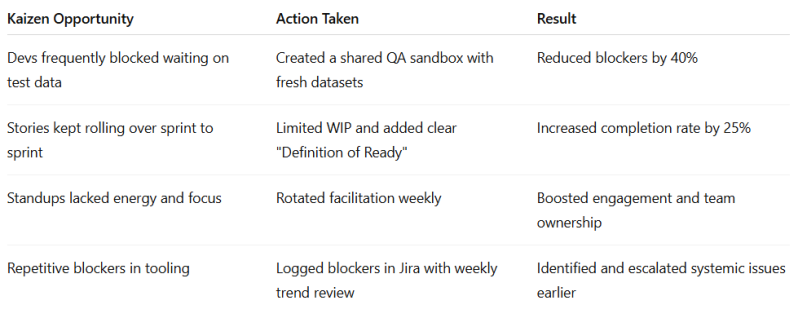Daily standups are a cornerstone of Agile delivery—a quick sync to align the team, surface blockers, and maintain momentum. But too often, they become robotic status updates or, worse, a box to check on the Agile to-do list. So how do we breathe life back into this ceremony? The answer lies in Kaizen—the Japanese principle of continuous improvement.
By applying Kaizen thinking to our daily standups, we can turn them from routine check-ins into powerful catalysts for team learning, process refinement, and performance growth.
🧠 What Is Kaizen?
Kaizen translates to “change for better.” It emphasizes:
- Ongoing, incremental improvements
- Participation from everyone—not just leadership
- A mindset of curiosity, not criticism
- Reflecting on how we work, not just what we do
While retrospectives often get the spotlight for continuous improvement, your daily standup is a goldmine for real-time micro-adjustments—if you know how to use it.
💬 What a Kaizen-Inspired Standup Looks Like
Traditional standup questions:
- What did I do yesterday?
- What am I doing today?
- Do I have any blockers?
A Kaizen-enhanced standup adds layers like:
- “Did anything slow you down yesterday?”
- “Is there a small tweak we could try today?”
- “Have we improved on yesterday’s blockers?”
- “What patterns are we noticing as a team?”
You’re not extending the meeting—you’re deepening the insight. Just 1–2 minutes of reflection can surface process issues before they become sprint killers.

🛠 Small Kaizen Changes with Big Impact
Here are real examples of how teams I’ve worked with used Kaizen thinking in daily standups:

🚦Spot the Kaizen Moment in Your Standup
Here’s what to listen for:
- Repeated mentions of the same blocker
- Work items that keep getting delayed
- Tasks that jump backward in the workflow
- Unclear priorities or scope creep
- Silence or disengagement from the team
These aren’t just updates—they’re signals for change.
🎯 Pro Tips to Make It Stick
✅ Keep a running list of micro-improvements suggested in standup. Review them in the retrospective.
✅ Empower every team member to suggest process tweaks, not just senior roles.
✅ Celebrate small wins—when a tweak works, call it out.
✅ Rotate standup facilitators so everyone owns the process.
✅ Create a “Kaizen of the Week”—a small habit the team agrees to try together.
💡 Why This Matters
Kaizen turns your team from task-doers to process-owners. When continuous improvement becomes a daily habit—not just a retro ritual—you unlock:
- Higher team engagement
- Fewer recurring blockers
- Faster delivery with less stress
- A culture of ownership and pride
You don't need a big meeting to make big improvements.
You just need 15 minutes and a team that’s willing to try something better—today.
🔚 Final Thoughts
The power of Kaizen lies in its simplicity—small, thoughtful changes that compound over time. By weaving continuous improvement into your daily standups, you’re not just managing tasks—you’re building a culture of reflection, adaptability, and shared ownership. It doesn’t take a massive overhaul to make a meaningful difference. One blocker addressed. One process improved. One conversation shifted. That’s the Kaizen way—and it starts with your next standup.
💬 Do your standups need a spark? Have you tried Kaizen tweaks in your daily flow? I’d love to hear what’s worked (or flopped!) for your teams.
#ManagingProjectsTheAgileWay #Kaizen #AgileStandups #ContinuousImprovement #AgilePractices #TeamPerformance
Download Document, PDF, or Presentation
Author: Kimberly Wiethoff